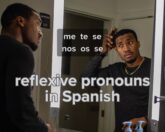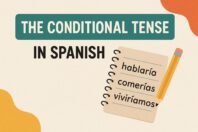Spanish Relative Pronouns: Explained For Beginners

Get our free email course, Shortcut to Conversational.
Have conversations faster, understand people when they speak fast, and other tested tips to learn faster.
More infoYou may have heard about the importance of relative pronouns in Spanish, even if you aren’t sure exactly what they mean.
Quite simply, Spanish relative pronouns are what we use to connect two or more ideas (clauses) which could have been expressed in independent sentences.
In other words, these pronouns help us sound less like Tarzan speaking, and instead make sentences sound natural by including fewer words.
Let’s see an example of this.
Without a Relative Pronoun
- El hombre vino a arreglar mi computadora. El hombre no me cobró ni un centavo – The man came to fix my computer. The man didn’t charge me a thing.
Using a Relative Pronoun “Que”
- El hombre que vino a arreglar mi computadora no me cobró ni un centavo – The man that came to fix my computer didn’t charge me a thing
You can see that the sentence without relative pronouns, sounds clunky and almost robotic.
This is why, as a Spanish student, it’s important to master relative pronouns early so that your sentences have more fluidity.
Now, let’s look at the general features of relative pronouns:
- They allow to add more information about the person or object mentioned before.
- They can substitute a noun of the main sentence (as any other pronoun).
- They can be singular or plural
- Some are only used with either people or things, while some of them with both.
- The Relative Pronouns: que (that), cual (which), quien (who) and cuanto (how much) and como (how) have to be written without a written accent or tilde, unlike the Interrogative Pronouns: qué (what), cuál (which), quién (who), cuánto (how much), cómo (how).
Now that we are clear about what relative pronouns are, we can examine each these pronouns, one by one.
1) That – Que
One of the most common and used relative pronouns in Spanish, since it’s used for both people and things – either singular or plural.
Examples:
- The table that I had bought last week, broke yesterday – La mesa que había comprado la semana pasada, se rompió ayer
- The girls that are talking to my mum, are my cousin and my wife – Las chicas que están hablando con mi mamá, son mi prima y mi esposa
- Here is the book that you lent me yesterday – Aquí está el libro que me prestaste ayer
- These are the people that will travel to Mexico next year – Estas son las personas que viajarán el próximo año a México
2) Who – Quien, quienes
These pronouns are only used with people.
Quien and quienes are generally used after a comma when introducing an explanatory sentence or oración explicativa in Spanish.
- That woman, who is wearing a black skirt, is my sister Lucía – Aquella mujer, quien está usando una falda negra, es mi hermana Lucía
However, when the pronouns are preceded by a preposition (con, para etc.), there is no need to use commas, because it will be a descriptive sentence or oración descriptiva in Spanish.
- That is the girl who I danced with all night long – Esa es la muchacha con quien bailé toda la noche
Examples:
- My uncle, who is an important doctor, lived in Cartagena for five years – Mi tío, quien es un importante médico, vivió cinco años en Cartagena
- Miguel and Rafael, who are my classmates, will go to the chess tournament – Miguel y Rafael, quienes son mis compañeros de clases, irán al torneo de ajedrez
- The people who I worked for were very skillful – Las personas para quienes trabajé eran muy hábiles
- The woman who Raul got married with is a teacher too – La mujer con quien se casó Raúl es una profesora también
3) El / la que, los / las que, el / la cual, los / las cuales
We use these pronouns to refer to people, as an alternative to using: preposition + quien/quienes.
They are differentiated by their formality, and you’ll generally find that these pronouns are more used in the written language (rather than spoken)to refer people and objects.
Examples:
- She is the girl one who I told you about – Ella es la chica de la que te hablé
- Gabriel and Daniela are the ones who are organizing the xmas party – Gabriel y Daniela son los que están organizando la fiesta de navidad
- The man ordered an ice cold beer, which he drank in one go – El hombre pidió una cerveza bien fría, la cual bebió de un solo trago
- The doctor welcomed all the patients who had made an appointment in advance – El médico recibió a los pacientes los cuales habían pedido una cita anticipada
4) Whose – Cuyo(a), cuyo(as)
These pronouns express possession.
They must always agree with the gender and number of the people or thing possessed.
Examples:
- Michell met a man whose parents are Venezuelan – Michelle conoció a un hombre cuyos padres son venezolanos
- The car, whose lights do not work, is a danger – El carro, cuyas luces no funcionan, es un peligro
- They were talking to a kid whose mother tongue is Japanese – Ellos estaban hablando con una niña cuya lengua materna es el japonés
- Nataly, whose father is a math teacher, got a scholarship in Argentina – Nataly, cuyo padre es profesor de matemáticas, obtuvo una beca en Argentina
5) Lo cual – lo que
The relative pronouns lo cual or lo que are used to refer to an idea or action already mentioned in a sentence. The main difference between them is that lo que tends to be used more in everyday conversation.
Examples:
- The kids broke the window which made angry their parents – Los niños rompieron la ventana, lo cual enfadó a sus padres
- It is said that more people are going to be fired which it is worrying me a lot – Dicen que van a despedir más personas, lo que me tiene muy preocupado
- Karina got a very good grade in the test which made his classmates proud – Karina obtuvo una nota muy buena el examen, lo cual enorgulleció a sus compañeros de clase
- Julián has got a raise which means he will be able to buy a new computer – Julián ha recibido un aumento, lo que significa que podrá comprar una nueva computadora
Sidenote: Lo que can also be used to refer to a pre-existing idea or action that was not mentioned in a previous sentence. However, lo cual cannot be used, since the idea or action is unknown.
Examples:
- I am going to show you what Juan wrote in the email to his boss – Te voy a contar lo que escribió Juan a su jefe en el correo electrónico
- I don’t know what you are thinking, but please, make up your mind once and for all – No sé lo que piensas, pero por favor decídete de una vez
- What the president said left everybody flabbergasted – Lo que dijo el presidente dejó a todo el mundo boquiabierto
- What you are about to do is very bad, so be careful – Lo que estás a punto de hacer está muy mal, así que ten cuidado
6) Where – Donde
This pronoun is only used when referring to a place.
With movement verbs like ir a (to go to) or viajar a (to travel to), sometimes adonde will replaced donde, but this is not a hard and fast rule.
Examples:
- The city where Simón Bolívar was born is called Caracas – La ciudad donde nació Simón Bolívar se llama Caracas
- We returned to the place where the taxi was waiting for us – Regresamos al lugar adonde el taxi nos estaba esperando
- Javier remembered his old house in Bogotá, where he grew up and lived with his family – Javier se acordó de su vieja casa en Bogotá donde creció y vivió con su familia
- They will know the small town where their dad used to live – Ellos conocerán el pueblito adonde vivía su papá
7) Cuanto(a), cuantos(as)
These pronouns are considered slightly formal, and so in spoken language, they tend to be replaced by other pronouns.
Let’s see them:
- Cuanto → todo lo que (uncountable nouns – sustantivos incontables)
- Cuanta → toda la que (uncountable nouns – sustantivos incontables)
- Cuantos → todos los que (countable nouns – sustantivos contables)
- Cuantas → todas las que (countable nouns – sustantivos contables)
Examples:
- I will pay you back all the money you lent me – Te pagaré cuanto dinero que me prestaste
- We will pay you back all the money you lent us – Te pagaremos todo el dinero que nos prestaste
- She will give you all the help you need, just call her – Ella te dará cuanta ayuda necesites, solo llámala
- She will give you all the help you need, just call her – Ella te dará toda la ayuda que necesites, solo llámala
- They are going to buy as many fruits as necessary – Ellos van a comprar cuantas frutas sean necesarias
- They are going to buy as many fruits as necessary – Ellos van a comprar todas las frutas que sean necesarias
Relative Pronouns in Spanish: Exercises
Choose the correct relative pronoun in Spanish to fit the below sentences.
1. Esta es la revista ___ estoy leyendo
- donde
- que
- cuyo
- cuantos
2. Karla y Daniela, ___ viven con Rebeca, están organizando una fiesta sorpresa para ella
- cuanta
- la cual
- quienes
- el que
3. Los niños, ____ padres trabajan en la misma empresa, podrán ir al campamento
- quienes
- que
- cuyos
- lo que
4. Esa es la plaza ___ tomamos las fotografías de las personas
- que
- donde
- quien
- las que
5. La chica ha obtenido una excelente calificación en la prueba DELE, ___ significa que podrá trabajar en Madrid
- cuanto
- el que
- las que
- lo cual
6. Necesitaramos ___ apoyo puedan ofrecernos en la competencia
- cuanto
- cuantos
- donde
- el que
7. Este es el libro ___ te había comentado. Es bastante bueno
- el que
- que
- cuyas
- donde
8. Las personas, ___ lengua nativa es el español, pueden dar clases en el instituto
- cuyas
- cuyo
- cuya
- lo cual
9. Ellos compraron muchos productos en el supermercado, ___ eran cereales y frutas en su mayoría
- las cuales
- cuantos
- los que
- los cuales
10. ¡No queremos que vayas a ese lugar ___ vimos a toda esa gente extraña!
- que
- quienes
- adonde
- la que
Answers
1. Esta es la revista que estoy leyendo
2. Karla y Daniela, quienes viven con Rebeca, están organizando una fiesta sorpresa para ella
3. Los niños, cuyos padres trabajan en la misma empresa, podrán ir al campamento
4. Esa es la plaza donde tomamos las fotografías de las personas
5. La chica ha obtenido una excelente calificación en la prueba DELE, lo cual significa que podrá trabajar en Madrid
6. Necesitaramos cuanto apoyo puedan ofrecernos en la competencia
7. Este es el libro que te había comentado. Es bastante bueno
8. Las personas, cuya lengua nativa es el español, pueden dar clases en el instituto
9. Ellos compraron muchos productos en el supermercado, los cuales eran cereales y frutas en su mayoría
10. ¡No queremos que vayas a ese lugar donde vimos a toda esa gente extraña!



